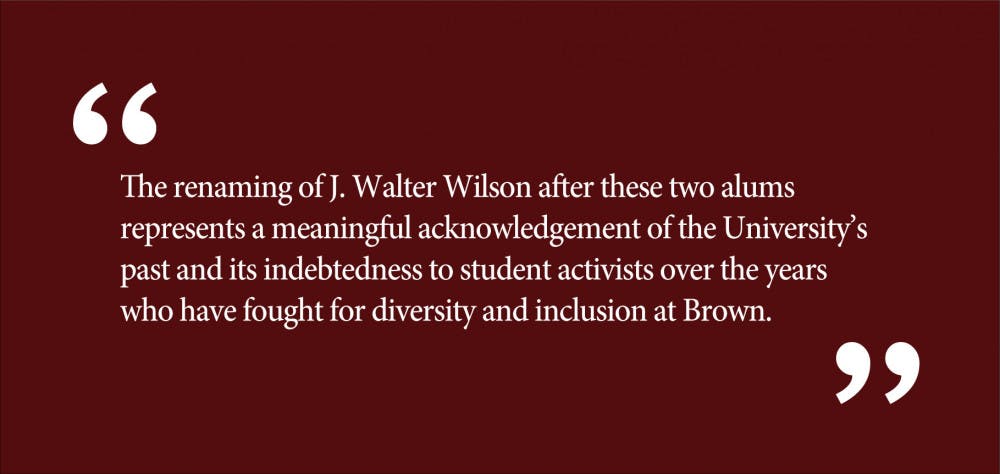On Saturday, Sept. 22, during the University’s 2018 Black Alumni Reunion weekend, President Christina Paxson P’19 announced the renaming of the heavily frequented, six-story administrative building formerly called J. Walter Wilson to Page-Robinson Hall. Portraits of the two eponymous alums — Inman Edward Page, class of 1877, and Ethel Tremaine Robinson, class of 1905 — already greet students entering the building. We commend the University for its decision to memorialize the extraordinary achievements of Page and Robinson and, in so doing, celebrate the courageous efforts of students of color to build a more inclusive, more just Brown.
Page and Robinson broke barriers at Brown. Page, born into slavery, was one of the University’s first black graduates; Robinson was the first black woman to graduate from Brown. Both had distinguished records as undergraduates: Page spoke at Commencement; Robinson graduated with honors and won the Class of 1873 Essay Prize. And both became educators later in their lives. The renaming of J. Walter Wilson after these two alums represents a meaningful acknowledgement of the University’s past and its indebtedness to student activists over the years who have fought for diversity and inclusion at Brown. As Bernicestine McLeod Bailey ’68 P’99 P’03 put it in a University press release, “We have a history here — a notable history — and it is something that should be celebrated and recognized by the whole community.”
Indeed, the names of buildings are serious reflections of an institution’s values: the principles and beliefs that undergird the intellectual and sociocultural life of a community and animate that community’s members. (To be sure, James Walter Wilson, the professor of biology and champion of life sciences research at Brown after whom the Brown St. building was named in 1962, remains a beloved figure at Brown.) The University’s decision to rename J. Walter Wilson takes on added salience in this present moment, as debates on college campuses about university buildings and their namesakes continue to rage. In 2016, Yale renamed one of its residential colleges, Calhoun College — originally named after John C. Calhoun, an American statesman from South Carolina who staunchly supported slavery and states’ rights — when students of color argued that the name made them feel disrespected, alienated and hurt. (The college is now named after Grace Hopper, a pioneering computer scientist.) A year earlier, in 2015, students and faculty members at Clemson University began advocating for the renaming of Tillman Hall, an iconic building on campus named after Benjamin Tillman, the virulently racist former governor of South Carolina.
Page-Robinson Hall offers the Brown community space for sustained self-reflection and ongoing conversations about historical erasure and future possibilities for racial justice. We hope that, for coming generations of Brunonians, the renamed Page-Robinson Hall will be a source of enduring inspiration — to build on the courage of its namesakes and carry on the unfinished fight for true justice and equality on College Hill.
Editorials are written by The Herald’s editorial page board: Anuj Krishnamurthy ’19, Rhaime Kim ’20, Grace Layer ’20, Mark Liang ’19 and Krista Stapleford ’21. Please send responses to this opinion to letters@browndailyherald.com and op-eds to opinions@browndailyherald.com.





